Lessons from COP 28
Shubhashis Dey, December 20, 2023
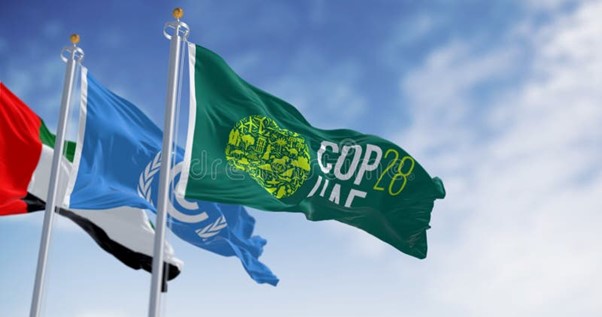
The honourable Prime Minister of India, Shri Narendra Modi, announced India’s bid to host COP33 (Y2028) during his speech at COP 28, Dubai. Last time India hosted the COP was in 2002 (COP 8), inaugurated by the then Prime Minister of India, Shri Atal Bihari Bajpayee in Vigyan Bhawan, New Delhi. The event was attended by 1,456 delegates from 167 countries. Most of the delegates comprised of officials representing the parties, media, and environmental experts.
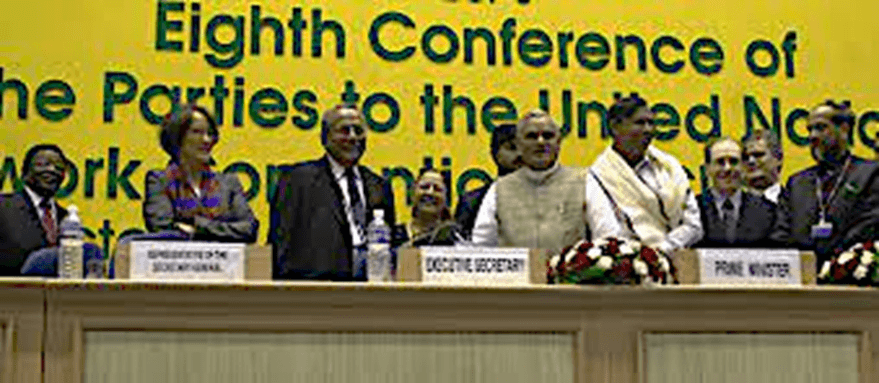
Though the pace of progress may not commensurate the urgency of climate action, much has happened during last twenty years. In 2002, I was working as a young engineer in a manufacturing plant in Chennai, completely oblivious of the impending threat imposed by climate change. The United Nations Framework Convention on Climate Change (UNFCCC) was yet to reach puberty; various market and non-market-based mechanisms under Kyoto protocol were still under negotiation. The concept of a Regional Climate Foundation like Shakti Sustainable Energy Foundation (Shakti) for India wasn’t even conceptualised. In India, the discourse on climate change was new and barring a few civil society organisations (CSO) such as TERI, Centre for Science and Environment and Development Alternative, the space was predominantly occupied by consulting firms.
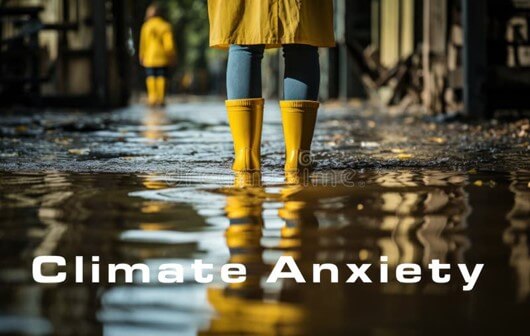
Today, we have Regional Climate Foundations founded in geographies including USA, Europe, China, India, Indonesia, Africa, Brazil, Australia, and Mexico, richly contributing to the climate discourse. Largescale participation of civil society organisations from Global South in COP 28 endorsed the contribution of regional climate foundations in building the capacity of climate focused civil societies in their respective geographies. Globally, climate change has become central to co-operation on issues beyond climate science including finance and global trade. Head of states, senior government leaders, climate envoys, business leaders, lobbyists, indigenous groups, and activists engage regularly on climate issues across platforms like COP, G7, G20, Davos and Boao Forum for Asia. The importance on climate change negotiation was clear during COP 28 in Dubai (November 30 to December 12, 2023), which was a major global event participated by heads of state from 140 countries, senior government leaders and over 80,000 participants and more than 5,000 media professionals. This COP witnessed large participation of delegates from global south including India.
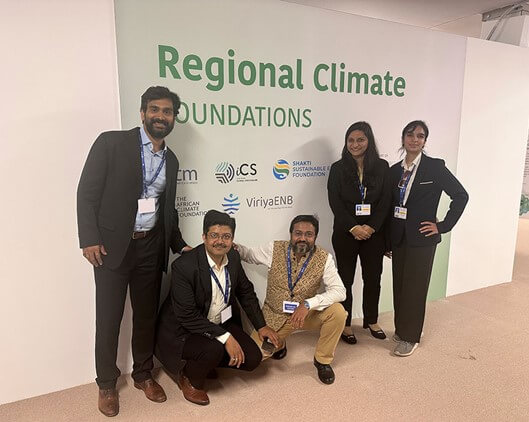
This COP was also unique and special for Regional Climate Foundations including Shakti. For the first time five Regional Climate Foundations from Global South, namely Shakti from India, Institute for Climate and Society (iCS) from Brazil, Africa Climate Foundation from South Africa, ViriyaENB from Indonesia and Iniciativa Climática de México (ICM) got together to host a COP pavilion to narrate climate stories from global south. In this Regional Climate Foundation (RCF) pavilion, Shakti organised eight events covering sectors including Renewable Energy, Industry, Agriculture and Land Use, Electric Mobility, and the cross-cutting issues like Climate Finance and Sub-national Climate Action (https://shaktifoundation.in/convening/join-with-us-events-at-cop-28/).
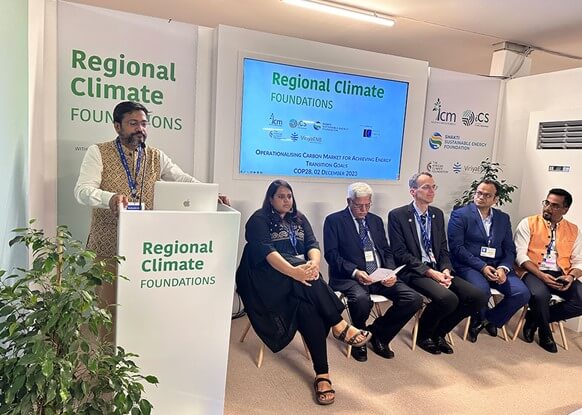
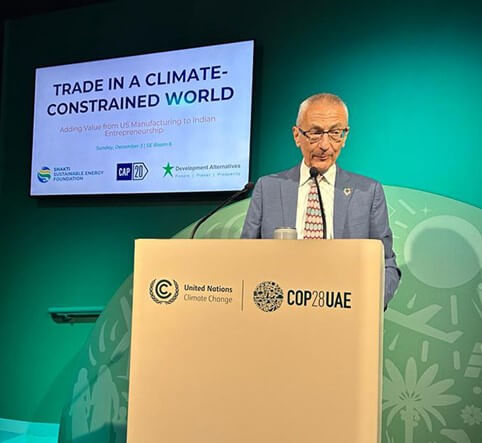
Shakti also co-hosted an official UNFCCC side event on Trade in a Climate-Constrained World: Adding Value from US Manufacturing to Indian Entrepreneurship along Center for American Progress and Development Alternative. Mr John Podesta, the Senior Advisor to the US President for Clean Energy Innovation, delivered the keynote address focusing on the role of Inflation Reduction Act (IRA) in driving clean energy innovation within USA and its impact on global economy and international trade.
Although no ground-breaking deal was achieved in COP 28, I would like to congratulate the Emirati Presidency for guiding global climate dialogue in the right direction. COP 28 was able to build larger consensus on key issues like mobilising finance for climate action, boosting renewable energy and energy efficiency, transforming food and agriculture, building climate adaptation and resilience, creating loss and damage fund, and acknowledging climate and health linkages. These wasn’t a minor achievement considering that the road to Dubai was inflicted by severe humanitarian crisis in Gaza, Israel and Ukraine and the controversy around the appointment of Sultan Ahmed Al Jaber, head of the Abu Dhabi National Oil Company and Masdar as the COP 28 president.
In my opinion the major takeaways from COP 28 organised by UAE in Dubai are as follows:

Global Stocktake: The findings from the Global Stocktake report highlighted our constant failure to tackle climate change. Earth is heating up fasters than predicted, seasonally breaching 1.5-degree centigrade threshold in few geographies causing irreparable changes to the planet’s ecosystem.
Commitment Towards Climate Finance: The COP 28 UAE leaders’ declaration on a global climate framework which acknowledges the needs to build the resilience of the international financial architecture to withstand frequent and severe shocks caused by climate change. The framework endorsed by 13 countries including USA, UK, Germany, India, and UAE recommends wider use of climate-resilient debt clauses, consideration of debt-for-climate swaps, and sustainability linked bonds as measures to navigate such shocks.
During COP 28, a total of around USD 85 billion is pledged in areas such as finance, energy, live and livelihood and green climate fund. However, it remains a far cry from realising the goal of pooling $100 billion per annum under GCF and mobilising trillions of dollars required by 2030 to finance climate change adaptation and mitigation needs in developing countries. To deliver climate finance at scale, the Global Stocktake report recommends creation of new and innovative sources of finance and reforms in multilateral financial architecture.

Boost to Renewable Energy and Energy Efficiency: Multiple nations signed a pledge to triple the world’s renewable energy capacity and double the rate of energy efficiency improvements by 2030. However, implementation of this pledge requires an investment of USD 10 trillion across the globe by 2030 and extensive improvement of current supply chain, grid connectivity and regulations. During the conference, China and India, countries with world’s largest and fourth largest renewable energy capacity respectively, questioned the merit of this pledge which may only remain on paper without a commitment on finance.

Climate Change and Food System Transformation: On the December 10, 2023, the COP 28’s Food, Agriculture and Water Day, 152 countries supported the COP28 UAE Declaration on Agriculture, Food Systems and Climate Action. To support smallholder farmers in developing countries, adapt to the severities of climate change while embracing sustainable agricultural practice, several countries and philanthropies including US, UK, UAE, and Bill & Melinda Gates Foundation have pledged support. On the same day, with the objective of cohesively respond to the threat faced by global food system due to climate challenges, the Alliance of Champions for Food Systems Transformation (ACF) was launched at COP28 by Brazil, Cambodia, Norway, Sierra Leone, and Rwanda. By the end of the day, the presidency was able to mobilise around USD 7 billion towards climate positive action in the food system.

Climate Adaptation and Resilience: COP 28 witnessed a nominal contribution of USD 166 million towards adaptation and resilience. Though mobilising finance for adaptation and resilience remains under delivered, 80 nations endorsed the COP28 UAE declaration on climate, Relief, Recovery and Peace to develop mechanisms for increasing the coverage of climate actions and finance to benefit citizens who are highly vulnerable to climate change. The declaration recommends six levers to enhance financial support for climate adaptation and resilience while emphasizing on the need for mobilising public and grant-based resources at scale and improving access to finance.
The Loss and Damage Fund: The loss and damage fund which was negotiated in earlier COPs is now operational with several countries making their initial pledge of around USD 700 millions. However, studies indicate that this fund in its current avatar will be grossly insufficient to address the plausible economic loss of USD 500 to 600 billion (estimated) to be faced by vulnerable communities by 2030. Though the global stocktake decisions of COP28 included loss and damage, it is lower in priority in comparison to climate mitigation and adaptation needs. This oversight remains open for negotiation in future COPs and may constrain finance flow towards loss and damage fund.
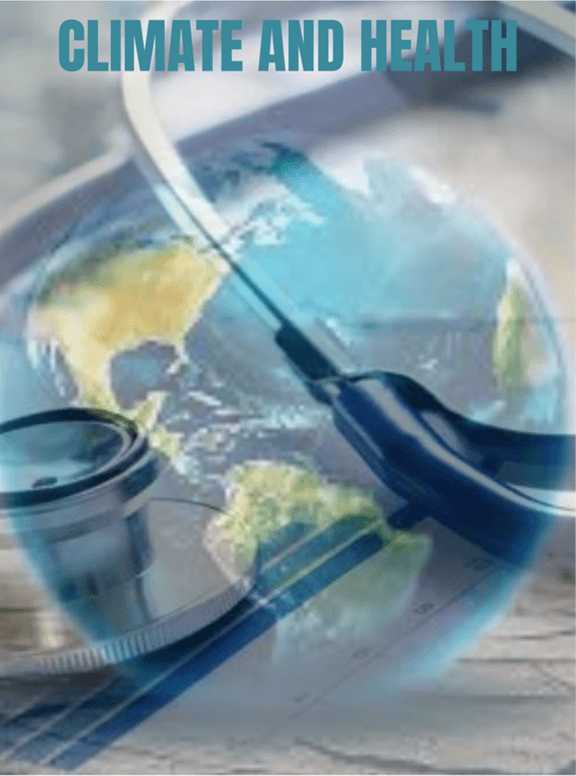 Climate and Health: 143 countries including USA, Germany, UK, France, China, and UAE endorsed COP28 UAE declaration on climate and health which stresses on acknowledging and acting upon the interlinkages between climate change, human health, and wellbeing. The countries endorsing this declaration commits to integrating health consideration into their climate change policy and vice versa. However, the onus of creating targets, timelines and milestones remains on subsequent COPs and other global convenings.
Climate and Health: 143 countries including USA, Germany, UK, France, China, and UAE endorsed COP28 UAE declaration on climate and health which stresses on acknowledging and acting upon the interlinkages between climate change, human health, and wellbeing. The countries endorsing this declaration commits to integrating health consideration into their climate change policy and vice versa. However, the onus of creating targets, timelines and milestones remains on subsequent COPs and other global convenings.
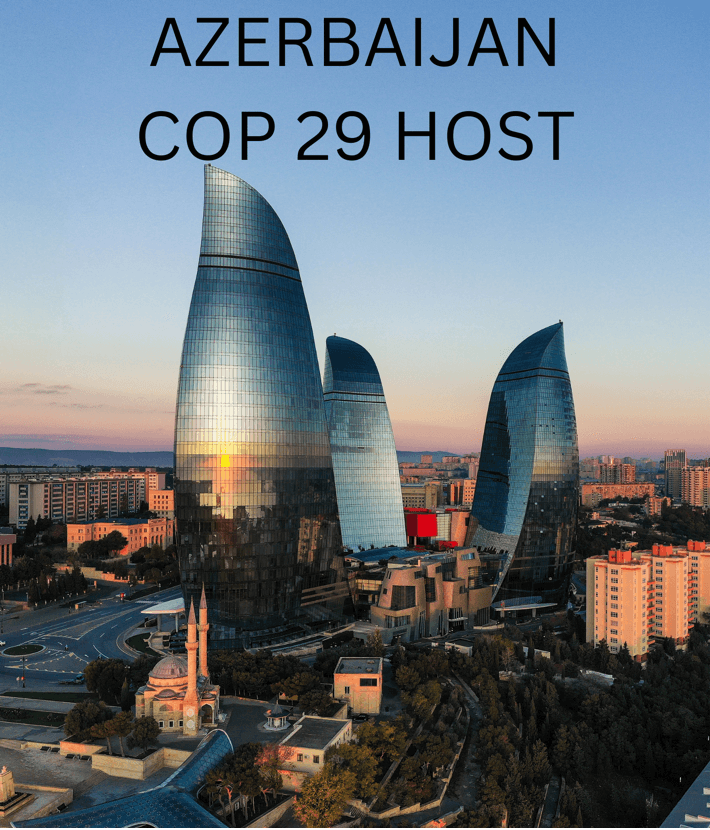 After days of uncertainty, eastern European block of countries supported Azerbaijan’s bid to host COP 29. The choice of Azerbaijan as the next COP president raises concern among several climate activists as the small nation of around 10 million people extensively rely on fossil fuel production and export for its sustenance. As UAE passes on the baton for COP presidency to Azerbaijan, another oil producing country, I will be curiously following how the legacy of COP28 unfolds in 2024.
After days of uncertainty, eastern European block of countries supported Azerbaijan’s bid to host COP 29. The choice of Azerbaijan as the next COP president raises concern among several climate activists as the small nation of around 10 million people extensively rely on fossil fuel production and export for its sustenance. As UAE passes on the baton for COP presidency to Azerbaijan, another oil producing country, I will be curiously following how the legacy of COP28 unfolds in 2024.

